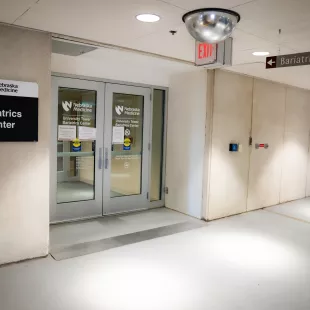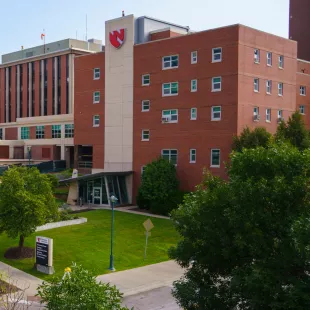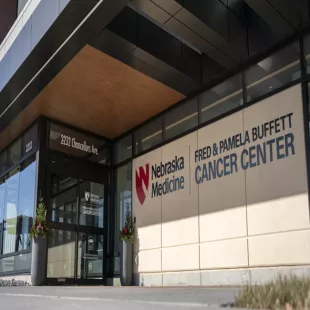The thyroid is a gland located in the lower front of your neck. Its job is to make hormones that help your body use energy, stay warm and keep the brain, heart, muscles and other organs working as they should. Symptoms of a problem with thyroid can often begin quietly and are non-specific. They can include fatigue and changes in weight, skin and hair. While many of us may experience these issues from time to time, if they persist, it could be your thyroid.
Experience and expertise related to all types of thyroid disorders
We have a large group of endocrinologists who specialize in thyroid disorders. They treat patients at the Nebraska Medical Center in Midtown Omaha and at Village Pointe Health Center in West Omaha.
We also have a team of providers dedicated to the treatment of thyroid nodules and thyroid cancer. At Nebraska Medicine, you can be seen by an endocrinologist and a thyroid surgeon on the same day.
The collaborative, multi-disciplinary approach to thyroid care leads to increased communication between our providers, which ensures all aspects of your condition are being addressed. Our surgeons are trained in endocrine, general and ENT surgery.
We treat all aspects of thyroid ailments and endocrine-related disorders
Parathyroid Issues
Learn more about how we treat all parathyroid issues, from tumors to hyperparathyroidism on this page.
Hypothyroidism
Hypothyroidism, which is caused by an underactive thyroid, can present with many vague symptoms. If you’ve not been feeling well and you’re not sure why, it’s reasonable to have your thyroid checked.
Symptoms can include fatigue, weight gain, dry skin and hair, trouble concentrating, constipation and changes in mood. If you have some of these symptoms and they continue to persist or worsen, you should be evaluated. Hypothyroidism occurs in about 10 percent of the population, tends to run in families, is three times more common in women than men and increases with age.
Hypothyroidism can be easily diagnosed in your doctor’s office with a blood test. The good news is that hypothyroidism can be controlled and managed with proper medications.
The most common cause of hypothyroidism is auto-immunity. This happens when the body develops antibodies against the thyroid which causes inflammation and less thyroid hormone is produced. People at greatest risk are those with a family history of autoimmune disease. Surgical removal of the thyroid, previous treatment with radioactive iodine or external beam radiation and some medications can also cause hypothyroidism.
Untreated thyroid conditions can lead to other health problems, so it's important to have it evaluated and treated, if necessary.
Hyperthyroidism
Hyperthyroidism is caused by an overactive thyroid, in which too much hormone is released by the thyroid. It’s less common than hypothyroidism and can be accompanied by sudden weight loss, a rapid or irregular heartbeat, sweating and nervousness. This is a treatable condition and treatment will depend on what's causing the hyperthyroidism.
The most common cause of hyperthyroidism is auto-immunity (Graves' Disease), overactive thyroid nodules or inflammation of the thyroid (thyroiditis, with a common version of this called Hashimoto's thyroiditis). Hyperthyroidism is diagnosed with a blood test and thyroid imaging. Generally, it is very treatable. It's important to understand the cause of hyperthyroidism.
Thyroid Nodules
Another common thyroid condition is the development of thyroid nodules. You may notice a nodule in the middle of your neck or pressure when swallowing, but for many people, it goes unnoticed. This nodule can be an abnormal growth of thyroid cells. Often times, there are no symptoms, but can cause hoarseness, difficulty swallowing and swelling in the neck. A nodule occurs in up to 50 percent of people by age 50 or 60. While they are often benign growths, they can be caused by inflammatory diseases or cancer, so they should be evaluated. Only about 5 to 10 percent cases are diagnosed as cancer and most have a high cure rate with treatment. If you are concerned you may have a nodule, discuss this with your doctor.
Thyroid Cancer
The majority of us will develop a thyroid nodule at some time in our lives. Almost all of them will be benign or non-cancerous. However, in a small number of cases (approximately 5 to 10 percent) the nodules are malignant. It can start as a swollen or enlarged lymph node. You may also experience a hoarse voice, neck pain or a thyroid nodule. The good news is the majority of thyroid cancers can be cured with appropriate treatment. While it is highly treatable, the surgery can be complex.
Nebraska Medicine has the only endocrine-trained surgeon in that state who specializes in thyroid cancer. We also have a head and neck team who specializes in thyroid surgeries. Studies reveal that thyroid surgery performed by highly-specialized and trained surgeons have better outcomes. Thyroid cancer is highly treatable with surgery and occasionally, radioactive iodine, depending on the tumor. It also requires lifelong thyroid hormone medication. Learn more about thyroid cancer.
Goiter
Goiter is an enlargement of the thyroid gland, which is just below the Adam's apple. There are several types of goiter, including Grave's disease and toxic nodular goiter. Goiter is more common among people with hyperthyroidism and hypothyroidism. In some cases, goiter will resolve on its own without medical attention. However, it can also be a symptom of a more severe thyroid condition that requires medical treatment. Goiter can often be treated with medications. However, in some cases, if it does not respond to thyroid hormone therapy and continues to grow larger, it may need to be surgically removed.
Our Locations
-

-

Diabetes and Endocrinology Center at Specialty Services Pavilion
4350 Emile St.
Get Directions
Omaha, NE 68105 -

-

Olson Center for Women's Health at Durham Outpatient Center
4400 Emile St.
Get Directions
Omaha, NE 68105
